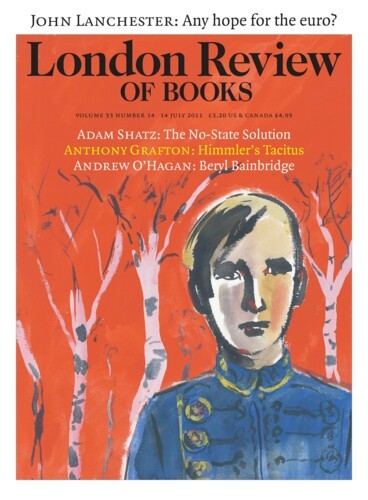In 1998, Helmut Kohl, who had governed reunited Germany for eight years and West Germany for eight years before that, was defeated at the polls, and Gerhard Schröder took over running the country. Even Kohl’s party was fed up with him: ‘Fatty’s got to go’ was the refrain. A year later it emerged that he had accepted more than a million marks in donations, and instead of passing the money on to the party as he was bound to do, used it to reward the constituencies and colleagues who had stood loyally by him. When the affair came to light he – again illegally – refused to identify the donor, claiming to have given him his ‘word of honour’ that he would remain anonymous.
For 16 years Kohl had done his best to make his party subservient to him. Now no one felt able to stand up to him. No one, that is, except Angela Merkel. While Kohl took refuge behind his ‘word of honour’ and the CDU tried to sweep the embarrassment under the carpet, Merkel pleaded for him to come clean. Kohl, she wrote in the Frankfurter Allgemeine, had ‘damaged the party’: now the CDU had to learn to live without him.
Yet it was thanks to Kohl that Merkel established herself in politics in the first place. She grew up in East Germany. Her father, Horst Kasner, a pastor in the West German Evangelical Church and a man with a sense of mission and a liking for socialist ideas, moved his family to a village in Brandenburg in the East in the mid-1950s. The GDR tolerated Protestant ministers, but only just, and Kasner’s salary was wretched. In 1957 he moved to the small town of Templin, where he ran an educational institute for evangelical theologians. Wherever Kasner happened to be, I was told, he was the man in charge. But the state leadership was displeased with his proselytising and his children – there were three of them – were urged by their parents to do all they could to remove the ‘stain’ of their father’s profession.
Obviously they had to do well at school and Merkel, unlike her classmates, even did well in her Russian class. She was one of those GDR children who learned at an early age that you had to be careful what you said in public. At home, she told me when I interviewed her in 2000, she had always been the most ‘market-based’ of her family: ‘Perhaps it was partly a reaction to my parents’ tentative attempts to discover something rational in the GDR.’ Yet she didn’t find her life there second-rate in every respect: her cousins in the West took riding lessons, but she and her siblings could go swimming in the lake. ‘I wasn’t gloomy, and I didn’t, like a lot of GDR citizens, go to the West with an inferiority complex.’
Because she is careful, Merkel waited before joining a political group. In December 1989, after the wall fell, she became a member of Democratic Awakening. She wanted reunification, she wanted a market economy, and she wanted to be a member of the Bundestag. That was when she first travelled to the West. It was an adventurous journey: ‘I thought it was dangerous in the West,’ she said. ‘I’d been to Moscow, I’d hitch-hiked across Russia – and then I got to Hamburg and asked in all seriousness whether a woman could safely spend the night on her own in a hotel.’
With an eye on the first and only free elections in the GDR in March 1990, Kohl merged Democratic Awakening with other conservative East German factions, including the East German CDU. Many former members of Democratic Awakening wanted nothing to do with the conformist CDU, but Merkel wasn’t one of them. She wanted a career, and she was staking it all on Kohl. He picked her out for that reason. She was, he said, his girl.
In retrospect it seems clear that the stand Merkel took against Kohl in the Frankfurter Allgemeine was the outstanding political action of her career so far. The CDU leadership immediately began to distance itself from Kohl, and in February 2000 Merkel was elected party chair; in 2005 she became chancellor. From 2005 until 2009 she governed in coalition with the second largest party, the Social Democrats (SPD). The office of foreign minister, traditionally left to the smaller party in German coalition governments, went to Frank-Walter Steinmeier, who was also vice-chancellor from 2007 until 2009. Merkel and Steinmeier got on so well their administration was known as the ‘cosy coalition’.
People were taken by the matter-of-fact way in which the pair managed the state. When the worst fears aroused by the financial crisis weren’t realised, there was general relief. Merkel would have liked to keep working with Steinmeier and the SPD, but at the 2009 parliamentary elections the Free Democrats (FDP) took votes from the SPD, and Merkel was obliged to keep her promise to enter a partnership with them. She hasn’t had a lot of good weeks since then.
The FDP puffed itself up: its leader, Guido Westerwelle, attracted the wrong sort of attention with neoliberal demands and ill-advised limelight-seeking. Neoliberals aren’t popular in the CDU. And Westerwelle’s excitability didn’t go down well with everyone either, certainly not with the chancellor. Cosy harmony in the cabinet was a thing of the past. And now something that had thus far been politely hushed up began to be said openly: that Merkel was strangely indecisive. She wouldn’t admit to anything, she was forever manoeuvring. By the summer of 2010 it was being said, according to Die Zeit, that the coalition was ‘the worst since the foundation of the Federal Republic’. It was monstrous, the paper commented, ‘that in important policy disputes, the head of government systematically withheld from the public the position she herself had taken’.
As long as Merkel was in a coalition with the SPD, she was dealing with people who were loyal to her, but who were also perfectly capable of speaking out. The finance minister, Peer Steinbrück, for example, castigated tax havens, comparing Switzerland, Liechtenstein, Austria and Luxembourg to Burkina Faso. There was a diplomatic scandal, but Steinbrück took the appropriate measures during the financial crisis, and there was no long-term damage.
Merkel has always said that she sees herself as a leader who allows other people to speak their mind, that her function is to mediate, not divide. But in the absence of her SPD colleagues and the cover they provided, her indecision and policy switches are more evident than is helpful. For example, Schröder’s Red-Green government had decided that Germany would abandon nuclear energy by 2020. Merkel seemed not to go along with that: indeed she promised in 2005 that existing nuclear power stations would be allowed to continue operating. That pleased the German nuclear lobby, as well as the many voters who would rather not have wind farms blotting the horizon. But no sooner had the reactor in Fukushima blown up than Merkel, observing the general reaction, changed her policy. ‘Worrying events,’ she said, had ‘altered some things’, and she made a complete U-turn.
It was the same with the Libyan intervention. Although Merkel has always described the alliance with the US and Nato as essential to the Federal Republic’s identity, Germany abstained in the vote on the UN resolution. There was no discussion: the CDU MP Ruprecht Polenz, chair of the Bundestag foreign affairs committee, was presented with a fait accompli. Not that this was in any way surprising: over the past few years German parliamentarians have repeatedly found themselves bypassed. ‘The government,’ Polenz said, ‘told the Bundestag that it had secret service information that we weren’t allowed to have, but our allies who voted yes probably had that information as well.’
Merkel is consistently inconsistent. In 2009, when the Greek financial crisis first hit, she initially refused financial aid, then gave in. Something similar happened this spring: she had declared that countries guilty of sloppy administration shouldn’t assume that the EU would bail them out: there had to be an automatic sanctions mechanism in the European Union. After a discussion with Sarkozy, she dropped the idea. It’s been this way for a long time. As minister for women and youth in the early 1990s, she campaigned for something to be permitted in West Germany that was taken for granted in the GDR: abortion on demand in the first trimester. That didn’t go down well with the conservative CDU. Today Merkel speaks out against embryo screening and maintains that every artificially fertilised egg cell is sacrosanct.
That firmness of principle is not one of Merkel’s strengths was already well known when she first stood as chancellor. But back then the media weren’t interested. Merkel was talked up like crazy. From the fact that she had a degree in physics, all kinds of magnificent qualities were inferred: that she saw society as an experimental arrangement; that she had an outstanding ability to calculate cause and effect, etc. ‘From the perspective of quantum chemistry,’ it was said in one newspaper, ‘Bavaria looks no different from Mecklenburg-Vorpommern, the West no different from the East.’ These encomia were combined with descriptions of her ‘mischievous girlish smile’ and her unaffected manner. Gone were all the photographs in which Merkel turns the corners of her mouth grumpily downwards. Before the 2005 elections the only pictures to be seen of her were extremely flattering.
When I talked to her in 2000, shortly after she was elected CDU chair, she told me that she ‘worried’ she was ‘going to lose’ her ‘originality and just go running around the place damped down’, that she would lose her ‘authenticity’. But she has long since trained herself out of the openness with which she spoke in those days. The word ‘worried’ would never pass her lips now in reference to herself. For her public speeches she’s collected a repertoire of clichés that apply always and never. She doesn’t want to say anything wrong, so she doesn’t say anything at all.
This article was translated by Shaun Whiteside. He has won the Schlegel-Tieck prize for his translations from German, which include Freud, Musil, Schnitzler and Bernhard Schlink.
Send Letters To:
The Editor
London Review of Books,
28 Little Russell Street
London, WC1A 2HN
letters@lrb.co.uk
Please include name, address, and a telephone number.


